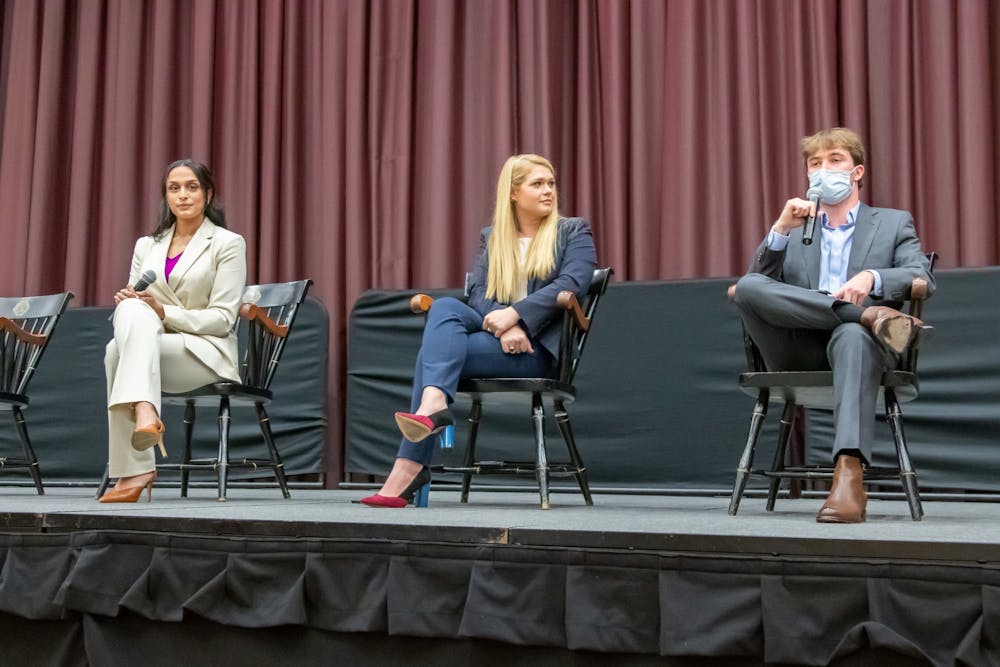The Daily Gamecock reached out to all seven candidates for the 2022 executive office in Student Government for comment on the amount they spent on their campaign and their thoughts on a recent student senate bill capping campaign spending.
Out of the seven, only two — Student Body President Reedy Newton and Vice President Maia Porzio — declined to speak on how much they spent during their campaign.
"That's not a number I'm comfortable sharing publicly, ever," Newton said. "I think it's a private matter."
After the student senate on Jan. 18 passed a bill capping campaign spending for Student Government races, Porzio said she would share how much she spent on the campaign, but then said on Monday in a text to The Daily Gamecock that she would not disclose her part in the ticket.
“I’m not able to make a comment about the personal finances of our campaign at this time, but I support this resolution and increasing accessibility for students to run for positions within student government,” Porzio said.
Since the bill passed, the limit for an executive candidate individually is now $1,500, with $500 added for subsequent executive candidates. No ticket, regardless of candidate number and type, can exceed $3,000.
Two tickets, Newton-Porzio and Catalyst, ran for executive office with both a presidential and vice presidential candidate. Under the rules outlined in the bill, these tickets would be allowed to spend up to $2,000.
The Catalyst ticket, Gurujjal Roopra for president and Faith Gravely for vice president, say they spent about $4,000 on their campaign. About 75% of that funding came from their families. Roopra lost the election after a runoff against Newton for student body president.
“If you had the money to spend $10,000 on your campaign and just blow it, well then you would," Roopra said. "This isn't just something you do because you kind of want it, you do this to win, so you put in 110% and sometimes you put in a little more than you actually have to spend.”
Roopra and Gravely said they support campaign spending limits but think that the limit for a ticket for multiple executive candidates should be $5,000.
“Any amount of work that you put in is so much, and when you have a cap that is, personally I think, a little low, it begins to just become another added stressor of, ‘Where am I gonna go to get all the necessities that I need?’” Gravely said.
The other two candidates for student body president, Nick Marzullo and Joshua Fair, ran without a vice presidential candidate.
Fair spent under $500, but said he cannot recall how much was without contribution from his family. Fair said he has mixed opinions about setting a cap for campaign spending but thinks that money makes a big difference in how elections go.
“You can have a lot of money and be unprepared, and look prepared," Fair said. "It can seem unfair in certain situations, but maybe a limit or a cap would be beneficial for college students.”
Marzullo spent around $50, with no donation from his family.He said he supports having a campaign spending limit, which he thinks should be $500 or less, or potentially have the university pay for a limited amount.
“I was so against putting a ton of money in that. It just didn't seem, first, right to me. I think when someone votes it should be on the premise of the person's values, not just who spends the most money and whose sign you see the most,” Marzullo said.

Under the guidelines outlined in the bill, the rules for a ticket with both executive candidates and senatorial candidates are the same as for the executive candidates. However, the ticket can spend another $100 for every student senate candidate. The upper limit is still $3,000. A ticket with only senate candidates can spend $250 for the first candidate and $100 for subsequent candidates.
In 2022, former Speaker of the student senate Noah Glasgow ran unopposed on the "Meet The Moment" ticket with 11 senate candidates. Glasgow and the 11 candidates were all elected. According to Glasgow, he spent $1,757.62 on the ticket — all of which was his own.
Glasgow said he supports the bill because he thinks it will strengthen equity and accessibility in Student Government.
"If you just look at the past exec boards, they kind of all look the same. They all come from the same background … I can't speak for everybody, that's not a universal thing, but typically they have a lot of money,” Glasgow said. “I think this is a good way to where we can balance the scales and the playing field to let other people with different backgrounds, different economic statuses, different connections, all of that stuff, have a fair shot at playing.”
Newton has until the end of the work day on Tuesday, Jan. 24 to sign or veto the bill, which would go into effect for the upcoming Student Government election this spring.

